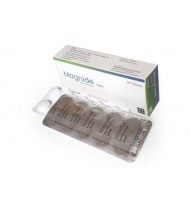Magnesium Oxide
Indications
Magnesium Oxide is indicated in-
- Relieving the symptoms of magnesium deficiency.
- Rapid or irregular heart rate, heart attack, angina pectoris, mild or severe hypertension.
- Tetania, muscle cramp, gastrointestinal cramps, stress, increased stimulability of muscles and nerves, call cramps, and cramp in newborn and young children.
- Gynecological diseases, cervical insufficiency, eclampsia, pre-eclampsia, tocolysis, dysmenorrhea.
- Calcification and ossification
- Prevention of kidney stone formation
- Diabetes treatment and migraine
Pharmacology
Magnesium belongs to the group of drugs called mineral support products. It occurs in nature in the form of the mineral periclase. Magnesium is required for energy production, oxidative phosphorylation, and glycolysis. In its purest form, magnesium oxide is a colorless or white crystalline material or very fine powder, with no odor and a bitter taste.
Magnesium helps to regulate diverse biochemical reactions in the body, including protein synthesis, muscle and nerve function, blood glucose control, and blood pressure regulation. It contributes to the structural development of bone and is required for the synthesis of DNA, RNA, and the antioxidant glutathione. Magnesium also plays a role in the active transport of calcium and potassium ions across cell membranes, a process that is important to nerve impulse conduction, muscle contraction, and normal heart rhythm.
Absorption: Approximately 24-76% of ingested magnesium is absorbed in the gastrointestinal tract.
Distribution: The volume of distribution of magnesium is 13.65 to 49.00 L
Metabolism: Magnesium does not appear to be metabolized.
Excretion: The majority of magnesium is excreted renally.
Magnesium helps to regulate diverse biochemical reactions in the body, including protein synthesis, muscle and nerve function, blood glucose control, and blood pressure regulation. It contributes to the structural development of bone and is required for the synthesis of DNA, RNA, and the antioxidant glutathione. Magnesium also plays a role in the active transport of calcium and potassium ions across cell membranes, a process that is important to nerve impulse conduction, muscle contraction, and normal heart rhythm.
Absorption: Approximately 24-76% of ingested magnesium is absorbed in the gastrointestinal tract.
Distribution: The volume of distribution of magnesium is 13.65 to 49.00 L
Metabolism: Magnesium does not appear to be metabolized.
Excretion: The majority of magnesium is excreted renally.
Dosage & Administration
The recommended daily dose for adults and adolescents (12-17 years) is 1-2 tablets.
Interaction
Aminoquinolones, Nitrofurantoin, Penicillamine, Tetracyclines, Fluoroquinolones, Digoxin, Lithium, Sodium polystyrene sulfonate, Nifedipine etc.
Contraindications
Hypersensitivity and severe renal impairment.
Side Effects
- Stomach upset and diarrhea
- Hypermagnesaemia
- Paralytic ileus
- Hyper-excitability
- Muscle weakness
- Sleepiness
Pregnancy & Lactation
It should be used as directed by the physician during pregnancy and lactation.
Precautions & Warnings
Before taking a magnesium supplement, tell your doctor or pharmacist if you are allergic to it.
Overdose Effects
Symptoms of overdose may include slow heartbeat, severe dizziness, confusion, muscle weakness, loss of consciousness, diarrhea and hypermagnesemia.
Therapeutic Class
Antacids, Electrolytes preparations, Oral electrolytes preparations
Storage Conditions
Keep out of reach of children. Store in a dry place, below 25°C temperature, and protected Irom light.
Magnide Tablet 365 mg
IndicationsMagnesium Oxide is indicated for the treatment of following condition:Relieving the sympt..
5.00Tk.
Magnum Tablet 365 mg
IndicationsMagnesium Oxide is indicated in-Relieving the symptoms of magnesium deficiency.Rapid or i..
12.00Tk.
Showing 1 to 2 of 2 (1 Pages)


